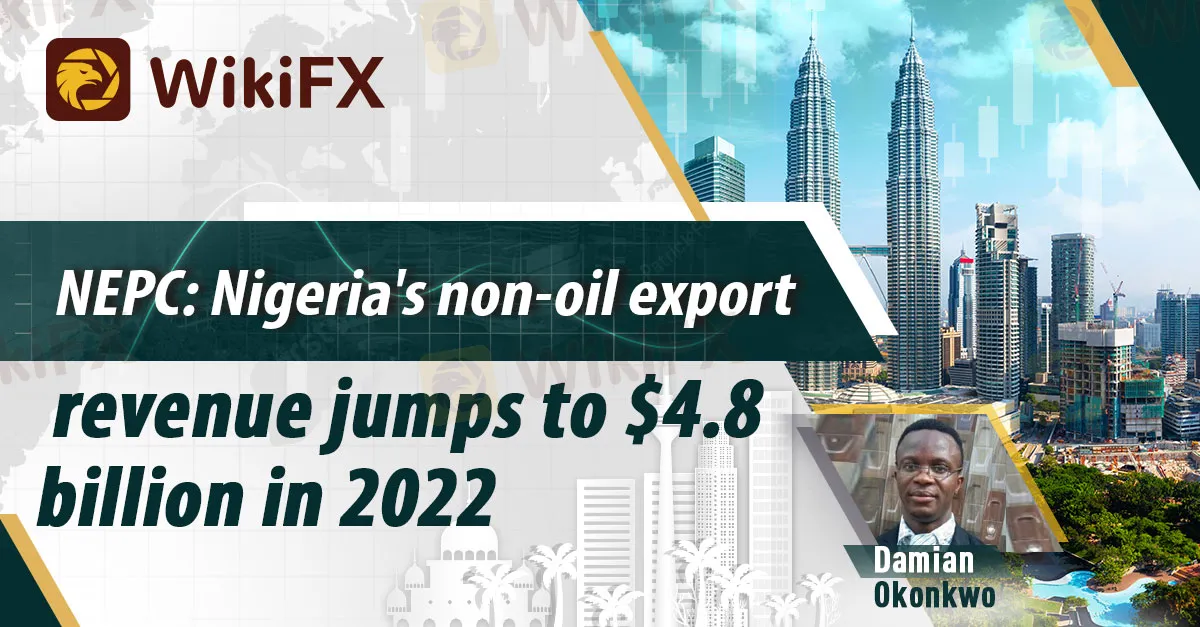简体中文
繁體中文
English
Pусский
日本語
ภาษาไทย
Tiếng Việt
Bahasa Indonesia
Español
हिन्दी
Filippiiniläinen
Français
Deutsch
Português
Türkçe
한국어
العربية
NEPC: Nigeria's non-oil export revenue jumps to $4.8 billion in 2022
Abstract:Nigeria recorded a significant increase in its total non-oil export for 2022. The total non-oil export according to the NEPC data rose to $4.8 billion in 2022.

By: Damian Okonkwo

Nigeria's non-oil exports have risen to $4.8 billion in 2022, according to the National Export Promotion Council (NEPC). This marks a significant increase from the previous year, as the country continues to diversify its economy away from relying heavily on oil exports.
The NEPC attributed the growth in non-oil exports to the government's efforts to promote local industries and encourage the production of goods for export. The council also cited the improving business environment and the availability of funding for small and medium-sized enterprises as key factors in the increase.
Some of the major non-oil export products that contributed to the increase include agricultural products such as cocoa, rubber, and sesame seeds. Other significant exports include solid minerals, textiles and garments, and processed foods.
The NEPC also revealed that the country's non-oil exports have been growing at a steady pace over the past few years, with a significant increase recorded in 2019 and 2020. The council is optimistic that the trend will continue, as the government continues to implement policies that support the growth of non-oil exports.
The rise in non-oil exports is good news for Nigeria's economy, as it reduces the country's dependence on oil and diversifies its revenue streams. It also creates job opportunities for citizens and helps to improve the standard of living for the people.
Overall, the NEPC's report is an encouraging sign for Nigeria's economy, as it demonstrates the country's ability to grow and diversify its exports. It is also a call to action for the government and private sector to continue to invest in and support non-oil export sectors for sustainable economic growth.

Disclaimer:
The views in this article only represent the author's personal views, and do not constitute investment advice on this platform. This platform does not guarantee the accuracy, completeness and timeliness of the information in the article, and will not be liable for any loss caused by the use of or reliance on the information in the article.
Read more

5 Cons of DB Investing Broker You Must Know
It's always advisable to read online review articles about forex brokers you are thinking to Invest your money with. The forex market has become increasingly unsafe due to the rise of fraudulent brokers. Review articles help you spot scam brokers and protect your money. Read this important article about DB Investing to stay fraud alert.

Scam Alert: Cloned Broker Scams on the Rise
Reputed authorities like the FCA have issued warnings against brokers who act genuine but are actually fake brokers. They copy details such as logos, names, branding, and sometimes even employee appearances to trick investors and steal money from them.

Fraud Alert: Don’t Trust These Firms, SC Malaysia Warns
Investors, Pay Attention! This is a serious warning from the Securities Commission Malaysia against 5 scam brokers operating in the forex market without a legal license. Here is the list of 5 fake brokers you must avoid.

Ultima Markets enters the UK and gains the FCA license
Ultima Markets has secured authorization from the FCA to offer CFDs to retail clients in the United Kingdom, marking its entry into one of the world’s most heavily regulated and competitive markets. According to the FCA register, the trading name “Ultima Markets” was approved on 21 July 2025.
WikiFX Broker
Latest News
Forex Hedging Strategies - Calming You Amid Market Chaos
Key Events This Week: ISM, Trade Balance And More Earnings
What Is Forex Currency Trading? Explained Simply
ASIC Regulated Forex Brokers: Why Licensing Still Matters in 2025
A Beginner’s Guide to Trading Forex During News Releases
Ultima Markets enters the UK and gains the FCA license
LSEG Announces £1 Billion Share Buyback Program
SEC Lawsuit Targets Real Estate Fraud Scheme by Joseph Nantomah
Think Uncle Sam Owes $37 Trillion? It's Far Worse Than That
SkyLine Judge Community: Appreciation Dinner Successfully Held in Malaysia
Currency Calculator


